 We’ve all heard the news that storage containers are increasingly more difficult to come by, and as a result, this could impact the upcoming holiday season. But just how scarce are they? The spot rate of booking a 40-foot container from Shanghai to Los Angeles hit $10,229 the first week of August, up 238 percent from the same time a year prior. According to the Toy Association, an industry trade group, about 85 percent of the toys sold in the United States are made in China. So, toy makers are making difficult decisions about which toys to send to retailers as a result. Jay Foreman, the chief executive of toymaker Basic Fun came up with an interesting solution. Instead of sending Tonka Trucks or Care Bears, the company is focusing on small, squishy toys. Why? Well, it’s all about bang for your buck. Basic Fun can fit $150,000 worth of Mash’ems, which are soft, squishy, water-filled collectibles, into a container. This is in comparison to $40,000 worth of Tonka Trucks. According to Foreman, “I’d rather sell fewer trucks and not have to raise the price exponentially because I’ll sell trucks again next year.” And now on to this week’s logistics news.
We’ve all heard the news that storage containers are increasingly more difficult to come by, and as a result, this could impact the upcoming holiday season. But just how scarce are they? The spot rate of booking a 40-foot container from Shanghai to Los Angeles hit $10,229 the first week of August, up 238 percent from the same time a year prior. According to the Toy Association, an industry trade group, about 85 percent of the toys sold in the United States are made in China. So, toy makers are making difficult decisions about which toys to send to retailers as a result. Jay Foreman, the chief executive of toymaker Basic Fun came up with an interesting solution. Instead of sending Tonka Trucks or Care Bears, the company is focusing on small, squishy toys. Why? Well, it’s all about bang for your buck. Basic Fun can fit $150,000 worth of Mash’ems, which are soft, squishy, water-filled collectibles, into a container. This is in comparison to $40,000 worth of Tonka Trucks. According to Foreman, “I’d rather sell fewer trucks and not have to raise the price exponentially because I’ll sell trucks again next year.” And now on to this week’s logistics news.
- Amazon plans to hire 150,000 for peak season
- IKEA warns supply chain disruptions likely to last into 2022
- Amazon, Ikea, Patagonia, others commit to zero-emission shipping by 2040
- LaserShip, OnTrac deal sets regional parcel carriers up
- Sephora launches same-day delivery service
- Publix launches hospital room prescription delivery
- Truck driver shortage worsens supply chain backlog
- No more room at the logistics warehouse inn, Prologis says
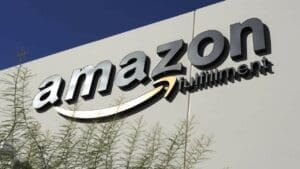 Every year, retailers and carriers go on a seasonal hiring spree to get ready for the peak holiday season. And this year is no exception, especially as online shopping continues to surge. Earlier this week, Amazon announced plans to hire about 150,000 seasonal employees, which is a 50 percent increase over last year. Amazon said that the average starting pay of jobs in the US was $18 an hour. Facing fierce competition for entry-level workers, the company has also been offering signing bonuses of as much as $3,000, depending on location, and as much as an additional $3 per hour for workers willing to work overnight or weekend shifts. This move should help to give the company a bit of a cushion as it seeks to meet the growing demand for the holiday season.
Every year, retailers and carriers go on a seasonal hiring spree to get ready for the peak holiday season. And this year is no exception, especially as online shopping continues to surge. Earlier this week, Amazon announced plans to hire about 150,000 seasonal employees, which is a 50 percent increase over last year. Amazon said that the average starting pay of jobs in the US was $18 an hour. Facing fierce competition for entry-level workers, the company has also been offering signing bonuses of as much as $3,000, depending on location, and as much as an additional $3 per hour for workers willing to work overnight or weekend shifts. This move should help to give the company a bit of a cushion as it seeks to meet the growing demand for the holiday season.
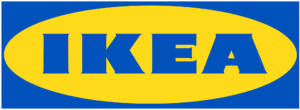 The global shipping crisis does not look like it is going away any time soon. This week, on the heels of record-breaking annual sales, IKEA announced that it is reducing the number of versions of some products as it struggles with raw materials shortages to ensure its most popular items are available. IKEA’s stores in North America are the hardest hit by product shortages, followed by Europe. To avoid disappointing shoppers, it is temporarily removing unavailable products from its websites and store showrooms, instead suggesting similar items. IKEA is also leasing more ships, buying containers and re-routing goods between warehouses to combat supply chain disruptions.
The global shipping crisis does not look like it is going away any time soon. This week, on the heels of record-breaking annual sales, IKEA announced that it is reducing the number of versions of some products as it struggles with raw materials shortages to ensure its most popular items are available. IKEA’s stores in North America are the hardest hit by product shortages, followed by Europe. To avoid disappointing shoppers, it is temporarily removing unavailable products from its websites and store showrooms, instead suggesting similar items. IKEA is also leasing more ships, buying containers and re-routing goods between warehouses to combat supply chain disruptions.
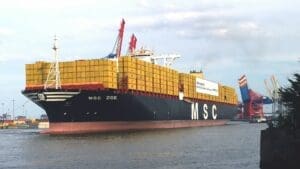 In an effort to reduce greenhouse gas emissions in global trade, a coalition of companies that includes Amazon, Ikea, and Patagonia has pledged to use only ocean shippers that use zero-carbon fuel by 2040. The cargo ships that ferry as much as 90 percent of the world’s products also produce nearly 3 percent of man-made carbon dioxide emissions each year, which is roughly the same annual output of Germany as a whole. The pledge to decarbonize ocean shipping within the next two decades came with calls for policymakers to help transform the industry. The coalition urged government officials to set ambitious marine fuel goals, implement regulations and market-based measures to encourage the rapid development of new fuels and technology, and to allow zero-carbon shipping fuels to “become competitive with fossil fuels as soon as possible.”
In an effort to reduce greenhouse gas emissions in global trade, a coalition of companies that includes Amazon, Ikea, and Patagonia has pledged to use only ocean shippers that use zero-carbon fuel by 2040. The cargo ships that ferry as much as 90 percent of the world’s products also produce nearly 3 percent of man-made carbon dioxide emissions each year, which is roughly the same annual output of Germany as a whole. The pledge to decarbonize ocean shipping within the next two decades came with calls for policymakers to help transform the industry. The coalition urged government officials to set ambitious marine fuel goals, implement regulations and market-based measures to encourage the rapid development of new fuels and technology, and to allow zero-carbon shipping fuels to “become competitive with fossil fuels as soon as possible.”
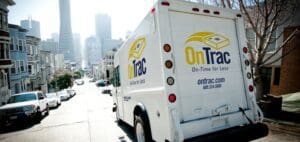 LaserShip and OnTrac announced that they have entered a “definitive agreement to merge.” The deal will create a giant among the regional parcel carriers and provide shippers with a consolidated option for e-commerce deliveries in the US, providing alternatives to UPS and FedEx. The agreement will give LaserShip, which delivers in the Eastern and Midwestern US a delivery presence in eight Western states, including all of California. Combined, the companies “will form the first coast-to-coast partner of choice for last-mile e-commerce deliveries,” according to the announcement. But the two carriers won’t begin to link their networks together until 2022 in order to “ensure continued exceptional service through the holiday season with expectations of heightened shipping volumes,” The deal is valued at roughly $1.3 billion.
LaserShip and OnTrac announced that they have entered a “definitive agreement to merge.” The deal will create a giant among the regional parcel carriers and provide shippers with a consolidated option for e-commerce deliveries in the US, providing alternatives to UPS and FedEx. The agreement will give LaserShip, which delivers in the Eastern and Midwestern US a delivery presence in eight Western states, including all of California. Combined, the companies “will form the first coast-to-coast partner of choice for last-mile e-commerce deliveries,” according to the announcement. But the two carriers won’t begin to link their networks together until 2022 in order to “ensure continued exceptional service through the holiday season with expectations of heightened shipping volumes,” The deal is valued at roughly $1.3 billion.
 Sephora has launched a same-day delivery service just ahead of the holiday shopping season, which is set up to deliver purchases within two hours for a fee. Customers can place an order on Sephora’s website or app and select the same-day delivery option at check-out. For a flat fee of $6.95, a courier will pick up the order and deliver the item within two hours. Customers can search the Sephora website by address to see qualifying items. The new service is now available seven days a week in most major cities and suburbs, the company said, but online orders must be placed by 4 pm local time for same-day delivery.
Sephora has launched a same-day delivery service just ahead of the holiday shopping season, which is set up to deliver purchases within two hours for a fee. Customers can place an order on Sephora’s website or app and select the same-day delivery option at check-out. For a flat fee of $6.95, a courier will pick up the order and deliver the item within two hours. Customers can search the Sephora website by address to see qualifying items. The new service is now available seven days a week in most major cities and suburbs, the company said, but online orders must be placed by 4 pm local time for same-day delivery.
 Curbside delivery has become the norm since the pandemic hit in 2020, and now Publix is adding a new method: bedside delivery. Beginning this fall, Publix Pharmacy is working with Sarasota Memorial Hospital – Venice in Florida to provide bedside delivery of prescriptions to patients before they are discharged. Patients’ prescription orders will be filled at a Publix store located across the street from the hospital. Pharmacy staff will take orders and deliver the medications directly to the customer’s room or to the nursing unit, and needed refills can be obtained from any Publix pharmacy location. According to Publix, the hospital room delivery eliminates a step for consumers who are already facing challenges in moving from inpatient care to at-home recovery.
Curbside delivery has become the norm since the pandemic hit in 2020, and now Publix is adding a new method: bedside delivery. Beginning this fall, Publix Pharmacy is working with Sarasota Memorial Hospital – Venice in Florida to provide bedside delivery of prescriptions to patients before they are discharged. Patients’ prescription orders will be filled at a Publix store located across the street from the hospital. Pharmacy staff will take orders and deliver the medications directly to the customer’s room or to the nursing unit, and needed refills can be obtained from any Publix pharmacy location. According to Publix, the hospital room delivery eliminates a step for consumers who are already facing challenges in moving from inpatient care to at-home recovery.
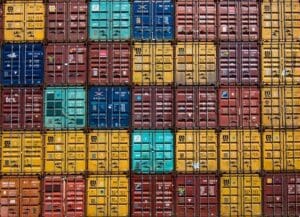 The backlog at US ports is adding strain to an already disrupted global supply chain. Amid a shortage of truck drivers, there are more than 13 loads for every truck at the ports of Los Angeles and Long Beach, adding to the supply chain backlog. Long Beach port director Mario Cordero said he expects a new deal with the Biden administration to keep ports open 24 hours a day, 7 days a week will help speed up long waits for truckers who are picking up shipments. While salaries for truck drivers are rising, finding drivers is becoming increasingly difficult. Even for those people seeking out a job, getting appointments at a DMV to get a license can take months.
The backlog at US ports is adding strain to an already disrupted global supply chain. Amid a shortage of truck drivers, there are more than 13 loads for every truck at the ports of Los Angeles and Long Beach, adding to the supply chain backlog. Long Beach port director Mario Cordero said he expects a new deal with the Biden administration to keep ports open 24 hours a day, 7 days a week will help speed up long waits for truckers who are picking up shipments. While salaries for truck drivers are rising, finding drivers is becoming increasingly difficult. Even for those people seeking out a job, getting appointments at a DMV to get a license can take months.
 Prologis, the world’s largest logistics warehouse operator said publicly on Friday what everyone has sensed and experienced for many months: there is no more space to be had, at least right now. During an earnings call, Prologis Chairman and CEO Hamid R. Moghadam said that “space in our markets is effectively sold out.” To put just how much space in being occupied in perspective, Prologis operates 995 million square feet of logistics warehouse space in 19 countries. The company said that vacancy rates are at unprecedented lows, and it maintained its outlook on average occupancy for the year at between 96.25 percent and 96.75 percent.
Prologis, the world’s largest logistics warehouse operator said publicly on Friday what everyone has sensed and experienced for many months: there is no more space to be had, at least right now. During an earnings call, Prologis Chairman and CEO Hamid R. Moghadam said that “space in our markets is effectively sold out.” To put just how much space in being occupied in perspective, Prologis operates 995 million square feet of logistics warehouse space in 19 countries. The company said that vacancy rates are at unprecedented lows, and it maintained its outlook on average occupancy for the year at between 96.25 percent and 96.75 percent.
That’s all for this week. Enjoy the weekend and the song of the week, Blink 182’s All the Small Things.

















